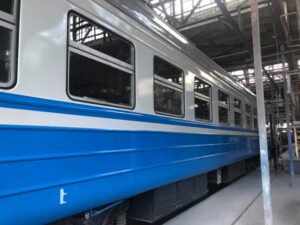
JSC Kyiv Electric Car Repair Plant, part of the structure of Ukrzaliznytsia, in January-March 2022 received a net loss of UAH 10.96 million against a net profit of UAH 2.61 million for the same period in 2021.
According to the interim financial report of the enterprise, published in the information disclosure system of the National Securities and Stock Market Commission, its net income in the first quarter decreased by 40.7% – to UAH 77.37 million.
The plant received a gross loss of UAH 3.37 million (against a profit of UAH 6.74 million a year earlier), almost UAH 10 million of loss was received from operating activities.
According to the plant, in the first quarter of this year, it sold five repaired electrical sections for UAH 75.63 million (in January-March 2021 – nine sections for UAH 118.5 million), two wheel sets and three electric machines (a year earlier – one pair and 108 electric machines).
Kyiv Electric Car Repair Plant was founded in 1868 as a workshop for the repair of steam locomotives and wagons. It specializes in the overhaul of electric trains for the railways of Ukraine, the repair of components and assemblies, electric machines, electric motors and wheelsets, the manufacture of spare parts.

The loss of virtual monobank in the first quarter amounted to UAH 109.6 million, Oleg Gorokhovsky, co-founder of the bank, said.
“The total result of the quarter is a loss of UAH 109.6 million, including a UAH 548.2 million loss in March,” he wrote on Telegram on Tuesday.
Gorokhovsky pointed out that almost UAH 1 billion of reserves for the loan portfolio was formed in March.
“January was a profitable month, and February closed with a small plus,” added the co-founder of monobank.
As reported, in January 2017, a mobile bank without branches – monobank – was founded by former top managers of PrivatBank Roman Gorokhovsky, Dmitry Dubilet and Mikhail Rogalsky. It operates under the license of Universal Bank, which, among other things, is part of the TAS group (Kyiv).
As of December 31, 2021, the number of monobank customers amounted to 5 million people.

The Temporary Investigative Commission of the Verkhovna Rada, created to check and assess the state of JSC Ukrzaliznytsia, found that by now the company has lost one third of its fixed assets.
“We state that the management of Ukrzaliznytsia does not protect or develop property and fixed assets entrusted to it by the state. The audit established the loss of one third of fixed assets. During the five years we studied, Ukrzaliznytsia fulfilled the capital investment plan by only 65%. Almost UAH 30 billion has not been disbursed in this direction. As a result, the railway infrastructure is in critical condition,” Head of the Temporary Investigative Commission Yulia Hryshyna said during the presentation of the report to the Verkhovna Rada.
Another reason for the problems, she said, is the significant influence of oligarchic groups that regularly underpaid the company, including for freight rates. As Hryshyna said, this has deprived Ukrzaliznytsia of UAH 100 billion over the past five years.
“The state in which Ukrzaliznytsia ended up for now no longer allows it to fully perform the tasks of transporting goods and passengers,” she said.

Lavina trade center LLC (Kyiv), the owner of Kyiv’s shopping and entertainment center Lavina Mall at 6 Berkovetska Street in Sviatoshynsky district of the capital, over 2020 received a net loss of UAH 210.8 million against a net profit of UAH 125 million in 2019.
According to the company’s statement in the information disclosure system of the National Securities and Stock Market Commission, its revenue decreased by 12.6%, to UAH 761.4 million.
At the same time, last year’s gross profit increased by 16.7% and amounted to UAH 473.4 million, while operating profit decreased by 79.3%, to UAH 114.7 million.
The uncovered loss of Lavina LLC increased 2.6 times, to UAH 338.4 million. Long-term liabilities increased by 56.5%, to UAH 2.52 billion, current – by 26.3%, to UAH 2.48 billion.
The company’s assets for the year increased by 29%, to UAH 5.41 billion.
Lavina LLC was founded in 2013. Its core business is the leasing and operation of own and rented property.

JSC Ukrzaliznytsia received UAH 11.9 billion in net loss in 2020 (compared to UAH 2.988 billion in net profit in 2019).
Such data are contained in the consolidated financial statements over 2020, released on the company’s website on Friday, confirmed by the leading international audit company Ernst & Young.
According to the company’s website, the result of Ukrzaliznytsia was significantly influenced by a decrease in income from freight and passenger traffic compared to 2019 by 10.3% and 58.3%, respectively, as well as a significant fluctuation in exchange rate differences, as a result of which a net loss was received from exchange rate differences in the amount of UAH 5.5 billion compared to UAH 4.3 billion of net profit in 2019.

Kremenchuk Steel Plant (Kremenchuk, Poltava region), which is part of the industrial assets of TAS Group, according to preliminary data, in 2020 received a net loss of UAH 22.81 million, while in 2019 its net profit amounted to UAH 66.03 million.
According to the information on the agenda of a general meeting of shareholders of the company scheduled for April 30, published in the information disclosure system of the National Securities and Stock Market Commission, the uncovered loss of the plant by January 1, 2021 amounted to UAH 50.57 million (a year earlier – UAH 27.71 million).
As reported, in 2019, the plant reduced its net profit by 3.2 times compared to 2018.
According to the plant, by the beginning of 2021 its current liabilities amounted to UAH 342.19 million, which is 9.5% more than a year earlier, long-term liabilities decreased by 3%, to UAH 258.74 million.
The company’s assets in 2019 increased by 6.6%, amounting to UAH 854.79 million, in particular total debtor indebtedness rose by 90%, to UAH 240.94 million.
Net worth as of January 1, 2021 amounted to UAH 253.86 million, in particular charter capital – UAH 132.12 million.
Kremenchuk Steel Plant is the leading foundry enterprise in Ukraine for production of steel castings for freight cars and heavy trucks.